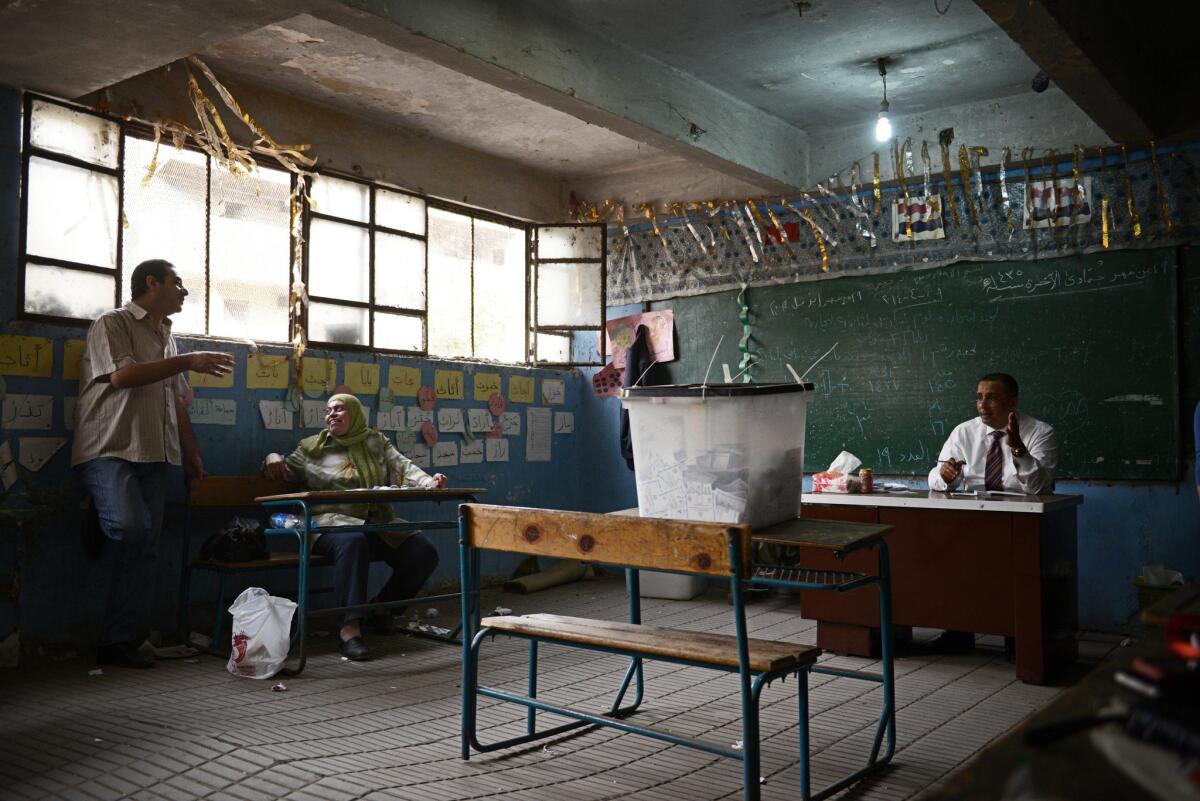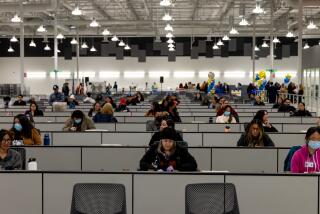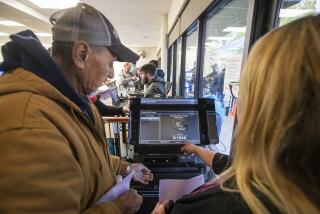Lagging turnout threatens to make election win in Egypt bittersweet

For months, Egypt’s military-backed interim government has systematically worked to silence political opponents. That silence, it seemed, took an eloquent turn Tuesday.
By staying away from the polls in the first presidential election since Mohamed Morsi was deposed by the military last summer, a loose amalgam of Islamists, young adults, secular democrats and the merely tumult-weary appeared poised to deny former military chief Abdel Fattah Sisi a prize he had ardently sought: a robust voter turnout that could be brandished as proof of a popular mandate for his rule.
There was little doubt that Sisi, the latest in a long line of strongman Egyptian leaders, would win the vote, which began Monday and had been scheduled to finish Tuesday. But if enough voters stayed home, it would be something of a hollow victory.
So just hours before the polls were to close Tuesday evening, authorities took the highly unusual step of extending the vote by a day. They cited the travel needs of those living outside the districts where they were registered.
No turnout figures for the initial days of voting were available. But anecdotal observations by election monitors, journalists and other observers suggested that after an early surge Monday powered by enthusiastic Sisi backers, the numbers fell off sharply, enough so that the government and supporters of the former field marshal embarked on a frantic round of eleventh-hour measures to try to get people to the polls.
Tuesday was abruptly declared a national holiday to encourage public workers to vote, and polling places were ordered to stay open an extra hour, a step that was rescinded after the extension into Wednesday was announced.
Election officials threatened to enforce a little-used regulation to fine voters who failed to cast ballots. Pro-Sisi talk show hosts unleashed a torrent of invective, denouncing the no-shows as treasonous pawns of the West and, in some cases, pleading with them to cast their ballots.
“I kiss your feet and beg you to go out and vote,” Tawfik Okasha, a hard-line Sisi backer, said on his Al Faraeen channel. “What else to you want? Do you want me to strip naked and beg?”
As Tuesday wore on, the Sisi campaign pushed back against the emerging narrative of a lower-than-hoped-for turnout, tweeting pictures of long lines of voters. The camp of Sisi’s sole opponent, liberal politician Hamdeen Sabahi, urged people to cast ballots but said its own monitors indicated the turnout was as low as 10% to 15%. Sabahi filed a formal objection with election authorities over the vote being extended.
Egypt’s scorching daytime temperatures, spiking above 100 degrees, did make being outdoors a misery on Tuesday. When it began to cool off at nightfall, some polling stations became livelier, but the Sisi camp apparently felt it could not make up lost ground in only a few hours.
While Monday’s voting was marked by elaborate shows of devotion to Sisi — singing, dancing, ululating, flag-waving — polling stations in Islamist-dominated areas of the capital and rural towns where Morsi’s Muslim Brotherhood is strong were often deserted. The Brotherhood, which has been branded a terrorist organization, denounced the vote, saying Morsi is still the legitimate president.
At polling places where there were in fact long lines of voters to be found, they skewed heavily to the middle-aged and elderly, a sign that Sisi’s attempts to reach out to alienated young people had not gone well. Morsi’s young supporters have turned university campuses into hotbeds of dissent, and on the secular side, one young leader after another of the 2011 revolution that toppled dictator Hosni Mubarak has been jailed.
Although Sisi rode an enormous wave of popularity after leading the July coup that ousted the unpopular Morsi, there had been signs that the cult of personality had curdled somewhat. Last week, a poll by the Pew Research Center indicated that his approval level hovered in the mid-50th percentile, with those who harbored unfavorable views of him put at 45%. Moreover, a significant minority — 4 in 10 — were said to still hold favorable views of the Muslim Brotherhood.
Since Morsi’s overthrow, state-run media and many private news organizations have been unflagging cheerleaders for Sisi even in the face of a wide-ranging crackdown on the Brotherhood. About 1,000 of its supporters were killed in mid-August when security forces violently dispersed sit-in camps, and hundreds more have died since in clashes with police. Thousands of purported Brotherhood backers are in jail, as is Morsi himself, facing multiple trials on charges that include several capital crimes.
Human rights groups and Western governments have been alarmed by increasing curbs on freedom of expression and assembly, measures that have been used to target journalists, academics, filmmakers and activists.
Some said overconfidence in a Sisi victory led some voters to bypass the election.
“Don’t just stay at home and say Sisi has already won it,” said a talk show host, Amr Adib. “What is important is that the world knows you approve this process.”
In the event of a low final turnout, he said sarcastically, “Why don’t you just go free Morsi and tell him to rule us again?”
Hassan is a special correspondent.
More to Read
Start your day right
Sign up for Essential California for news, features and recommendations from the L.A. Times and beyond in your inbox six days a week.
You may occasionally receive promotional content from the Los Angeles Times.






